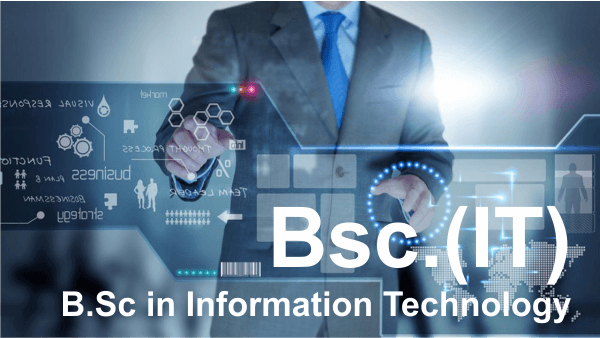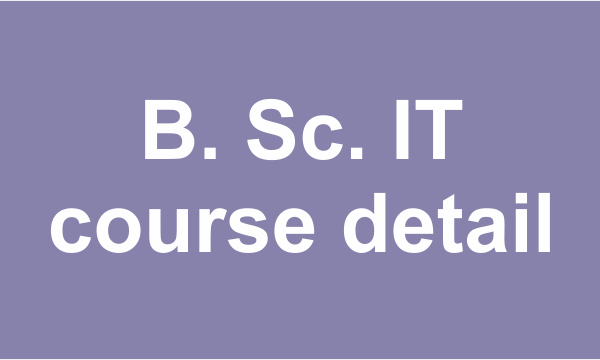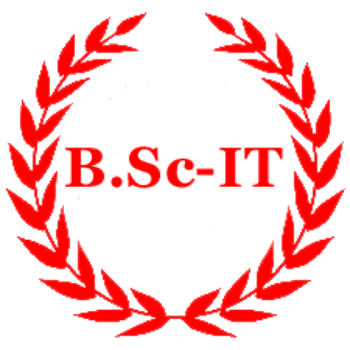What is the full form of B.Sc. ITB.Sc. IT: Bachelor of Science in Information TechnologyB.Sc. IT stands for Bachelor of Science in Information Technology. Depending on the nation, a bachelor's degree programme in information technology (B.Sc. IT) normally lasts three to four years. The main focus of this degree is on topics like networking, databases, and software. An undergraduate curriculum called BSc IT, or Bachelor of Science in Information Technology, concentrates on studying information technology and its usage in various professions. The curriculum aims to give students a firm grounding in computer science, mathematics, and programming and a comprehension of the fundamental ideas and procedures behind information technology. This article will discuss the facets of the BSc IT degree, including its curriculum, employment opportunities, and advantages. 
SyllabusThe BSc IT curriculum aims to give students a thorough understanding of all the different facets of information technology. The curriculum is set up to give students academic knowledge and real-world experience, and it is made to stay up to the quickly evolving technological environment. Courses in computer science, mathematics, programming, database administration, networking, and web development are often included in the three-year degree. Students often take foundational courses in the first year of the degree, like computer organisation, programming concepts, algebra, and English communication. Students take classes in computer networks, database management systems, and data structures and algorithms in the second year as they continue their study of information technology. Students can choose to focus on a specific field of information technology during their third years, such as web development, software engineering, or data analytics. The course material is created to give students the knowledge and abilities they need to pursue careers in information technology. Students gain knowledge of various programming languages, including Java, Python, and C++, as well as tools for database management, like SQL, and web development, including HTML and CSS. Also, they learn the fundamentals of software engineering, data analytics, and computer networks. Job ProspectsThe future need for IT workers is anticipated to rise due to the IT sector's explosive growth. Students who complete the BSc IT degree will have a solid information technology foundation, expanding their options for employment in the IT sector. Graduates can pursue careers as software developers, web developers, network administrators, database administrators, and IT consultants, among other positions. The possibility of job progression is one of the most important benefits of a career in IT. IT employees who acquire new skills and certifications might advance their careers swiftly. Also, many IT workers can work remotely, which offers flexibility and work-life balance. BenefitsThe BSc IT programme has many advantages for students. It first gives students a strong foundation in computer science and information technology, which they may use in various industries. Employers strongly recognise the program's ability to give students practical experience with various software tools and programming languages. The curriculum also aids students in acquiring analytical, problem-solving, and critical thinking abilities, which are crucial in any sector. Also, students learn good teamwork, talent employers strongly admire. Students have an opportunity for both personal and professional improvement through the BSc IT programme. Interactions with business executives, internships, and research projects are all student opportunities. These opportunities give students useful, real-world experience and aid in forming their professional networks. Skills TaughtA thorough grasp of information technology and its uses in various fields is given to students in the Bachelor of Science in Information Technology (BSc IT) undergraduate degree programme. 
Typical abilities taught in BSc IT programmes include the following: Programming Students learn how to create and execute software applications using a variety of programming languages, including Java, Python, and C++. Database Management Students acquire knowledge of data modelling, database administration, and database security, as well as how to design, create, and maintain databases. Web Development Students acquire knowledge of client-side scripting, server-side scripting, content management systems, and how to create websites and web apps. Networking Students learn about network standards, technologies, security, and how to create and manage computer networks. Running Systems Students learn about the fundamentals of operating systems and how to set up, customise, and administer various operating systems, including Windows, Linux, and Unix. Software Engineering To design and create high-quality software applications, students learn to implement software engineering principles and methodologies. Project Management By learning how to plan, carry out, and keep track of IT projects, students develop their project management abilities. Communication Skills Students develop oral and written communication, presentation, documentation, and expert writing abilities. Differences Around the World in BSC ITMany universities and colleges around the globe offer a degree programme called Bachelor of Science in Information Technology (BSc IT). Although the fundamental ideas and abilities taught in BSc IT programmes are typically constant, the curriculum and available courses may vary depending on the region and educational system. In BSc IT programmes, the following foreign variations could exist: CurriculumBSc IT programmes may have different curriculum depending on the nation and the school. While other programmes offer a wider education in IT concepts and skills, some might concentrate on particular IT areas, like web development or cybersecurity. Different languages are available for BSc IT programmes depending on the nation and school. For instance, English-language programming is widespread in many nations, whereas Spanish- or French-language programming may only be available in certain areas. Program LengthBSc IT programmes can vary depending on the nation and the school. BSc IT programmes may take four years to finish in some nations, like the United States, while taking only three years in others, like the United Kingdom. AccreditationDepending on the nation and school, BSc IT programmes may or may not be accredited. While some programmes might not have accreditation, others might have it from national or foreign organisations. Career ProspectsBSc IT graduates may have different employment prospects depending on the nation and area. There may be a high demand for IT professionals in some nations, such as the United States, while there may be more competition in the employment market in other nations, such as some European nations. 
Why BSC ITFor various reasons, one might decide to enrol in a Bachelor of Science in Information Technology (BSc IT) programme. Here are a few of the main explanations: High Demand for IT SpecialistsAs society's dependence on technology grows, so has the demand for qualified IT specialists. Students who pursue a BSc IT degree will have the abilities and information needed to be successful in a range of IT-related professions, including software development, web development, database administration, network administration, and IT consulting. Wide Range of Career OptionsThe field of information technology is enormous and varied, and IT workers have access to a wide range of career options. A BSc IT degree provides students the knowledge and tools to investigate various career options and creates professional and personal development opportunities. Potential for Job AdvancementIT workers have the potential to advance their careers and take on more senior roles as they gain knowledge, experience, and certifications. Students who pursue a BSc IT degree have a strong foundation in IT and have more job options available to them. Flexibility Working remotely is a common choice for IT professionals, allowing flexibility and a healthy work-life balance. A BSc in IT can lead to jobs that allow flexibility regarding working hours and location. Technology AdvancementsKeeping up with the most recent trends and developments is crucial for IT workers, given the quick pace of technological advancements. Students who pursue a BA IT degree will have the knowledge and abilities needed to keep up with the most recent developments in the information technology industry. IT professionals frequently take on challenging tasks that require creativity, problem-solving, and critical thinking. Getting a BSc in IT can help you launch a career that offers challenging, satisfying work that is also cognitively stimulating. In conclusion, those interested in a dynamic and expanding industry with a high demand for qualified professionals may find that enrolling in a BSc IT course is a sensible decision. The course provides various job options, the chance to progress in your career, flexibility in where and when you work, and intellectually stimulating work that can be both challenging and rewarding. Who Should Perform BSC IT?Students interested in information technology and want to work in this quickly expanding sector should enrol in a Bachelor of Science in Information Technology (BSc IT) course. 
Listed below are some characteristics of students who would be a good match for a BSc IT programme: Strong Enthusiasm for TechnologyStudents naturally interested in technology are good candidates for BSc IT programmes. They should be enthusiastic about computer science, programming, software creation, and other connected fields. Analytical SkillsStudents who are analytical and appreciate solving problems are a good fit for a BSc IT programme. IT specialists frequently work on challenging tasks that call for analytical thinking. Good Communication AbilitiesStudents well-suited for a BSc IT degree have excellent verbal and written communication abilities. IT professionals must be able to speak clearly with co-workers, clients, and stakeholders because they frequently work in teams. Students who are excellent at paying attention to details are a good fit for a BSc IT programme. IT experts must be meticulous for software to function correctly and be error-free. Strong Math BackgroundCandidates for a BSc IT degree should have a solid background in mathematics. Math is a basic part of computer science. Math is crucial for understanding algorithms, data structures, and other IT concepts. Flexibility Candidates for a BSc IT programme should be flexible and receptive to change. IT specialists must be able to adjust to new technologies and trends because the field of information technology is constantly changing. Creative Problem-Solving AbilitiesStudents with these abilities are a good fit for a BSc IT degree. To create original solutions to complex problems, IT workers need to have the ability to think creatively outside the box. Application ProcedureDepending on the university or college providing the Bachelor of Science in Information Technology (BSc IT) programme, there may be differences in the admissions procedure. The BSc IT admissions process does, however, typically entail the following steps and requirements: Research Find colleges or universities that offer BSc IT degrees by doing some research. Find out the school's curriculum, admission requirements, costs, and other specifics. Check Your Eligibility Determine if you meet the program's eligibility requirements, which typically include finishing a 10+2 education in the science track. A minimum grade in the 10+2 or other prerequisite examinations, such as the JEE or state-level engineering entrance exams, may be required by some programmes. Application Complete and send the college or university's provided application form. You may need to submit an application fee. Entrance Exam Some universities and colleges may hold an entrance exam to be admitted to their BSc IT degree. Your ability and understanding in subjects like math, logical reasoning, and computer science are tested on this exam. Selection Based on Merit Sometimes, admission is based on your performance on qualifying examinations like the JEE or 10+2. Interview Some universities and colleges may perform an interview to evaluate your motivation, interest in the programme, and communication skills. Admission Letter The institution or college will send you an admission letter if you are chosen. You must pay the necessary fees within the allotted period to confirm your admission. Attend the orientation programme the university or college offers to learn about the program's academic rules, curriculum, and other crucial information. EligibilityDepending on the university or college providing the programme, different individuals may meet the requirements for a Bachelor of Science in Information Technology (BSc IT) degree. However, the following are some usual expectations for general eligibility requirements: Academic Qualifications
The candidate's educational requirements should have included completing 10+2 or an equivalent programme from a recognised college or university. The candidate should have studied physics, chemistry, and mathematics, among other science-related topics. Minimum PercentageThe applicant must have obtained a minimum grade in the 10+2 test, typically between 50% and 60%. The minimum percentage may change depending on the institution or college that offers the BSc IT programme. Age RestrictionsThere are no age restrictions for BA IT programmes. However, some schools or universities have strict age requirements. ConclusionThe BSc IT degree is a great option for those interested in a career in information technology. The curriculum is meant to keep up with quickly evolving technologies and give students practical experience. Students who complete the programme will thoroughly understand information technology, including web development, database management, networking, and programming. Also, the programme offers students many advantages, including personal and professional development and improving analytical, problem-solving, and critical thinking skills. Many job prospects in the IT sector are made available by the programme, including those for positions like software developer, web developer, database administrator, network administrator, and IT consultant. A BSc degree won't just limit you to working for corporations. The government sector also offers many opportunities. A few well-known employers of BSc IT graduates are Apple, Amazon, Dell, HP, TATA, and Reliance. The BSc IT degree gives students a lot of freedom and employment opportunities in the rapidly expanding information technology industry. The demand for qualified IT workers who can design, manage, and maintain the software systems and infrastructure that underpin businesses and organisations will rise as the world becomes increasingly dependent on technology.
Next TopicFull Forms List
|
 For Videos Join Our Youtube Channel: Join Now
For Videos Join Our Youtube Channel: Join Now
Feedback
- Send your Feedback to [email protected]
Help Others, Please Share










